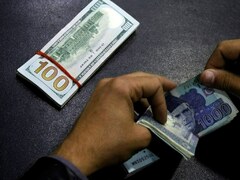The dollar slipped against the euro on Wednesday as traders took profits from the greenback's recent rally and braced for Thursday's US trade data. According to a Reuters poll, the trade deficit is expected to have narrowed to $57 billion in December after two consecutive months of record highs. The wide trade gap has been a persistent weight on the dollar.
"The market and analysts have to do a gut check," said T.J. Marta, senior currency strategist with RBC Capital Markets in New York. "Do they think that structural problems reemerge and the dollar gets sold off again, or are we at a tipping point where the economic fundamentals take over again and we see dollar buying?"
Since the start of the year, the dollar has gained nearly 6 percent against the euro and over 3 percent against the yen.
Fed chief Alan Greenspan gave the dollar another boost on Friday when he said market forces and greater budget discipline should help reduce the record US current account gap.
The trade deficit for November, originally reported at more than $60 billion, is seen as likely to be revised downward after Canada, a major US trade partner, said a computer error had led to mistakes in its calculations.
Yet underlying sentiment for the dollar remains positive and if the trade gap were to narrow more than expected, the dollar could rebound strongly, some said.
"The markets seem to want to buy dollars in this environment, so it would not take a very big ... surprise to get a pretty big dollar rally in the wake of the number," said Lara Rhame, foreign exchange strategist with Credit Suisse First Boston in New York.
In New York, the euro was trading at $1.2808, up 0.3 percent from its levels late on Tuesday.
Against the yen, the dollar was down 0.2 percent at 105.55 yen, but within sight of a three-month high of 106.20 yen. Against the Swiss franc, the dollar slipped 0.4 percent to 1.2159 francs. Sterling was 0.2 percent higher at $1.8589.
The dollar got a brief boost early in the session on published comments from a Federal Reserve official that traders took to mean the US central bank may soon pick up its pace of tightening interest rates.
Prices of short-dated US debt climbed as the bond market interpreted the comments to be mostly dovish, since if the Fed removed the word "accommodative," then it might not have to tighten monetary policy further.
BR100
15,103
Increased By
140.9 (0.94%)
BR30
42,619
Increased By
540.8 (1.29%)
KSE100
148,196
Increased By
1704.8 (1.16%)
KSE30
45,271
Increased By
438.2 (0.98%)






















Comments
Comments are closed.